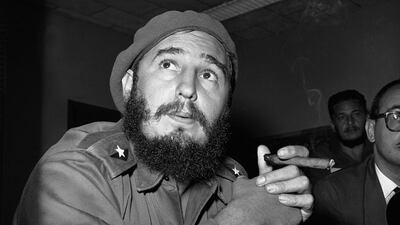WASHINGTON // For more than a century, Cuba was known to make the world’s finest, most fabled smokes.
So much so that cigars were nicknamed “havanas”.
But ever since Washington slapped a trade embargo on Cuba in 1961 after its revolution, those havanas have been forbidden fruit for Americans.
Today, thanks to substantial foreign investment, improved business practices and the tobacco master blenders who fled Cuba, many of the best cigars are not made in Cuba.
Cigar Aficionado magazine published a list – seen as an industry standard – of the year’s best stogies. Of the 25 cigars on the 2014 tally, just two were Cuban.
“Americans have always had the allure of having a true Cuban cigar,” said Bob Materazzi, owner of Shelly’s Back Room, a cigar tavern at the intersection of Washington’s business, law firm and government districts.
“But there’s been a whole generation of people who haven’t had Cuban cigars, and they like the Dominicans” and others, he said.
Mr Materazzi thinks it will take five years before Cubans can hit the US market – and even then they will be at a disadvantage.
“They don’t have quality control. They’ve overworked their crops,” Mr Materazzi said, ticking off challenges for Cuban manufacturers.
“A lot of their product is losing their character.”
Another complication is that since the United States does not recognise Cuban copyrights, several companies now own foreign-branded copyrights of famed Cuban labels such as Montecristo and Cohiba.
“That’s going to be a challenge for the cigar market, to say who owns the right to those names,” said Justin Russell, Mr Materazzi’s colleague.
What American smokers crave is the social camaraderie they find in the cigar world, regardless of brand, Mr Russell said.
“I can order an $8 stick and still sit across from the guy who orders the $50 stick and I can light up with him and we talk about anything we want.”
Even if Cuban cigars are ultimately introduced to the US market, smokers today are used to other tastes.
“For the last 50 years people have grown to know Nicaragua, Dominican and Honduras,” cigar empresario Matt Krimm said.
“Sure, people will come in and buy those Cuban products” in part out of curiosity, he added.
“Whether it fits their taste profile or not is up for debate.”
Mr Krimm, who is co-owner of W Curtis Draper Tobacconist, America’s third oldest tobacco shop – said US customers today are spoiled for choice of cigars from the nations that have dominated the market in Cuba’s absence: the Dominican Republic, Honduras and Nicaragua.
He and customers are not necessarily clamoring for Cubans.
If the eventual legal sale of Cuban cigars “fits in with our business model, we’ll do it”, Mr Krimm said.“But we’ve been in business 127 years, and the last 50 plus years we haven’t been able to sell anything Cuban and we’re still around. So it obviously won’t make or break us.”
* Agence France-Presse

